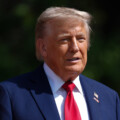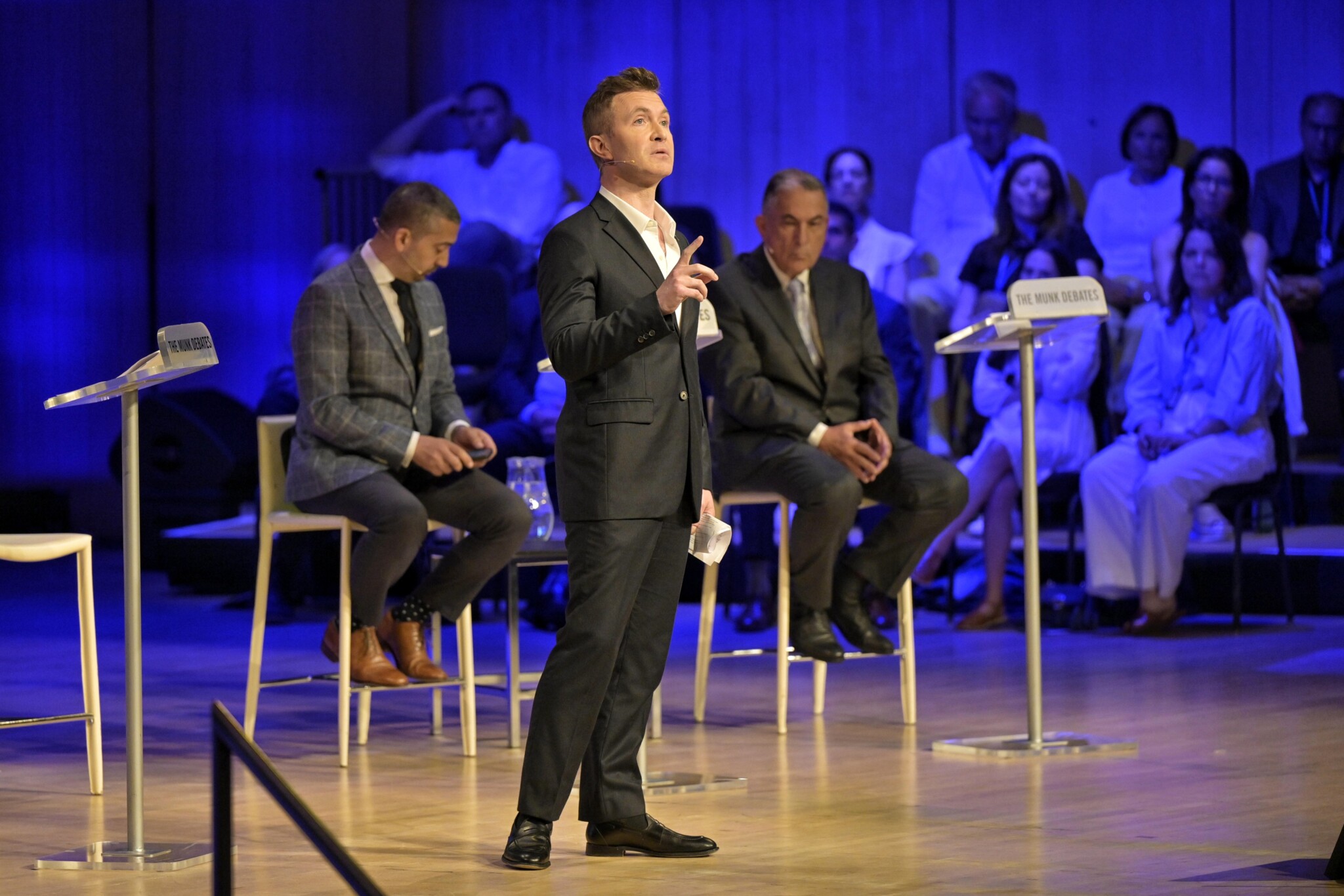This week, The Munk Debates hosted its much-anticipated debate on anti-Zionism at Toronto’s Roy Thomson Hall. As the war in Gaza rages on following the Oct 7th massacre in Israel, and hate crimes against Jews abroad grow, the age-old question has again been raised around whether anti-Zionism—the rejection of statehood for the Jewish people in their ancestral homeland—should be equated to hatred against Jewish people as a whole. And so, the resolution was put to some of the world’s sharpest minds.
The event marked The Munk Debate’s 30th debate. The con side, arguing anti-Zionism is not antisemitism, included Mehdi Hasan, former MSNBC anchor and CEO and editor-in-chief of the new media company Zete. He was accompanied by award-winning Israeli broadcaster and Haaretz columnist Gideon Levy.
Arguing for the motion, that anti-Zionism is antisemitism, was Natasha Hausdorff, an international legal expert and barrister. She was joined on the pro side by award-winning journalist and author Douglas Murray.
Once the debate clock struck zero, Munk Debate moderator (and Hub publisher) Rudyard Griffiths announced the pro team had won, having convinced five percent of the audience to change their minds. The final results were 66 percent voting that anti-Zionism was antisemitism and 34 percent insisting it was not.
The Hub’s managing editor Harrison Lowman got the chance to speak to debater Douglas Murray, who has been visiting Israel regularly over the past year. They discussed the conflict in the Middle East, Canada’s reputation on the world stage, U.K. and European elections, and the future of the West.
On Israel
HARRISON LOWMAN: Douglas why do you think it’s important if not essential for non-Jews, like yourself, to defend Israel and the Jewish people?
DOUGLAS MURRAY: I think there are lots of reasons. The first is that I believe in following the facts and the truth. And I think this has been subjected to a huge defamation and lies and libels. The second is, in some way, the moral one. Which is not just the debt that the world owes the Jews from the 20th century, but the debt that the Western world owes Jews as one of the great wellsprings of our civilization and one of the great gifts to our civilization.
On the less moral level, on a strategic level, I think that people should support Israel’s right to defend itself. Because the war that Israel is currently fighting is a war that we may all well be involved in at some point closer to home. To deny Israel the right to defend itself will end up being us denying the right of ourselves to defend ourselves someday. This is something I do not want to see happen. But you know, in Canada, war seems an awfully long way away. You’ve got a pretty good neighbour.
HARRISON LOWMAN: You’ve been in the Middle East over the course of the last few months. What does a Canadian in an armchair here commenting on the conflict, potentially criticizing Israel, not comprehend about what it’s like to be in that “neighbourhood” in the Middle East?
DOUGLAS MURRAY: Imagine living in a glass cocoon, a protective device. You’re just fine. And then one day, the glass shatters. And that’s what Israel is living in. It’s living in the period after the glass shattered. And that is when the worst human evil comes right at you and things you thought could never be done are done right in front of you. To have an army of the barbarous, torturous rapist sadists in front of you is quite something. And that’s what Hamas has produced. And on the seventh of October, it rampaged and did things that your readers can’t imagine.
HARRISON LOWMAN: Yes. You described some of those horrors during the debate. I want to bring up a couple points your opposing debaters brought up to give our readers a sense of the debate and your responses.
So, one of the points that was raised was that you and Natasha Hausdorff spoke at great length about the suffering of Israeli citizens and Jews in the West, but that you overlooked the immense suffering of Palestinians, many of whom are innocent and are dying in Gaza from Israeli bombs. That you treated them as “invisible.” What’s your response to all this?
DOUGLAS MURRAY: It’s not true. And we repeatedly said as much. Gideon Levy criticized me for not talking about the Palestinians in my opening speech, it’s because I didn’t have time. But we spoke about the Palestinians later, including the citizens of Gaza, who present a serious potential insuperable issue for Israel and the region.
I wanted to focus on the initial kind, the initial act of war, which was Hamas invading Israel. Wars have consequences. You don’t start a war and then when you lose it, grouse about the fact you’re losing it.
There’s no reason why you can’t be pro-Israel and also hope that someday the Palestinians might have a peaceable state that they wish to run peacefully alongside their Israeli neighbors. But, that’s not in the offing at the moment. And the other side advocated things that are impossible. If you abolish the Jewish state, what is this one state that will exist? It’s a dream of antisemites.
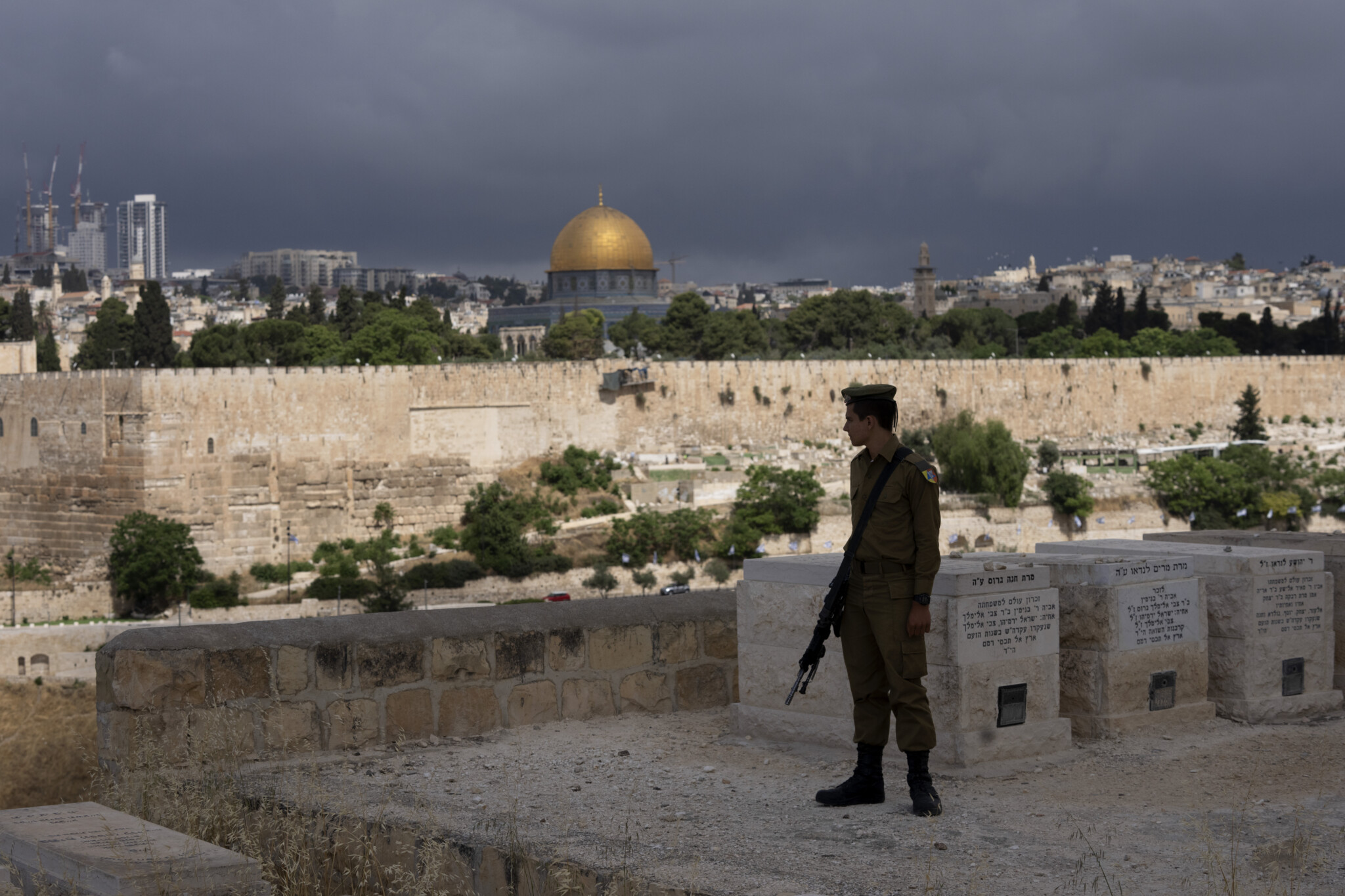
An Israeli soldier pauses in the Mount of Olives cemetery, just outside of the Old City of Jerusalem, as he turns towards the Dome of the Rock Mosque in the Al-Aqsa Mosque compound, May 13, 2024. Maya Alleruzzo/AP Photo.
There is a plan for how you would have a Palestinian state. The outlines are pretty clear in the West Bank. But the question of Gaza is so complicated. This is a piece of territory that the Egyptians used to have. They do not want it back. They want nothing to do with it. Because they know, as Israel knows, that it’s a hugely radicalized population because Hamas have had 18 years to radicalize the population and about 18 years to steal the money the international community has given them for their own enrichment of leaders, and to build these terror tunnel networks underneath Gaza.
This is a great tragedy because it has killed the dream of peace for millions of Israelis and others. The suffering of Palestinians in Gaza is all down to Hamas. All of it. The fact that Hamas started the war. And also the fact that Hamas, as we know from the intercepted messages of [Hamas leader] Yahya Sinwar that were published in the Wall Street Journal last week, Hamas want the Palestinian people in Gaza to die and to suffer. As Sinwar said, it’s with the deaths of our civilians that we will win this war. That’s quite a thing to believe and to say.
HARRISON LOWMAN: I’m wondering how you see the state of play right now. Prime Minister Netanyahu has dissolved his war cabinet. He’s been criticized for lack of strategy there. They’ve lost a couple of key members including centrist former military chief Benny Gantz. You say that they had every right to respond with the force in which they did. That this is a righteous cause that they need to bring to its ultimate conclusion. But can you point to any government missteps along the way?
DOUGLAS MURRAY: Everyone’s got an opinion on the conduct of the war. Everyone in Israel has an opinion. Everybody in the rest of the world seems to have one too.
I think that the long pause before going into Rafah was frustrating, and to me, inexplicable. But, you’ve always got to be careful when things are going on in the present because of the amount we don’t know. It’s perfectly possible that the army was held back and stopped from the final phase of the Gaza war, which is Rafah and the freeing of any remaining hostages who are there, and the killing or capturing of Sinwar who is believed to be there. It seems to me inexplicable that a month’s delay happened.
But you know, maybe there’s a reason I don’t know. Maybe there were negotiations going on with Hamas and Egypt and so on, that I don’t know about. Like everyone, I want the war over as soon as possible. But without full sight of the political and intelligence landscape, it’s very hard to understand.
On Canada
HARRISON LOWMAN: You travel the world. What does Canada’s reputation look like these days?
Recommended for You
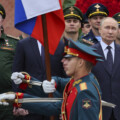
‘Putin has no intention of stopping this war’: Sir Bill Browder on three years of war in Ukraine and how Russia is evading sanctions

DeepDive: It’s time to end the boom-and-bust cycle of Canadian shipbuilding
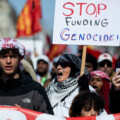
Alan Kessel: Genocide, weaponized: How a legal term became a political bludgeon
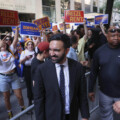
Need to Know: Progressive politicians’ public safety problem
